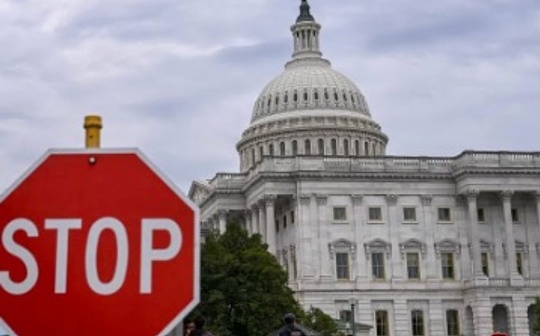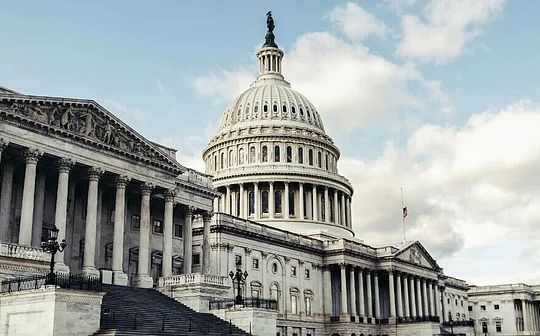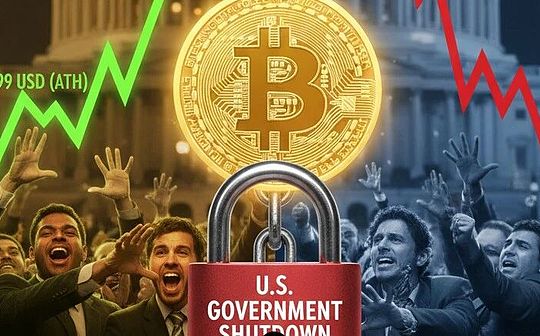
Author: Li Dan, Wall Street News
The U.S. federal government shutdown has lasted for more than a week, and it seems that it will not be possible to break the deadlock between the two parties and restore government operations in the short term.
On Wednesday, October 8, Eastern Time, the government shutdown entered its eighth day. In the recent sixth round of voting, the U.S. Senate once again rejected a bill to provide temporary funding for the government. The voting results highlighted the continuing differences between the two parties: Republican lawmakers collectively opposed the Democratic bill, and most Democrats boycotted the bill proposed by the Republican Party and passed by the House of Representatives.
The positions of the two parties are becoming increasingly tougher. The core difference is whether to continue the medical insurance subsidies provided by the Affordable Care Act (ACA) introduced during the Obama administration.Senate Republican Leader John Thune accused the Democratic Party of being controlled by left-wing interest groups, while Senate Democratic Leader Chuck Schumer called Republican House Speaker Mike Johnson a “real obstacle.”
The government shutdown has begun to have a material impact on federal agency operations.The Internal Revenue Service (IRS) announced Wednesday that nearly half of its employees will be furloughed.The Transportation Security Administration (TSA) is currently operating normally but is under pressure.Air traffic control at Nashville Airport was forced to partially close due to Federal Aviation Administration (FAA) manpower shortages.
The bipartisan bill failed in the Senate for the sixth time, and the voting results were clearly divided
The Senate voted again on Wednesday on the government funding packages proposed by the two parties, and the results were the same as the previous five times.
The Republican bill would fund the government until November 21 and add $88 million in security funding for lawmakers and government officials, but it did not include the health care provisions demanded by Democrats.The motion received 54 votes in favor and 45 against, still 6 votes short of the 60-vote threshold required to advance the motion.
Among Republican lawmakers, only one, Rand Paul, voted against it on Wednesday.With Paul’s opposition, a total of eight Democratic congressmen must support the bill to pass.In this vote, only three people from the Democratic camp defected.
The Democratic Party’s bill proposes to extend government operating funds until October 31, and also includes extending the medical insurance subsidies introduced during the Obama administration that expire at the end of this year, and revoking the Trump administration’s Medicaid cuts.
In Wednesday’s vote, the bill performed worse than the Republican plan, with only 47 votes in support, which was lower than the 52 votes against.Like the previous five votes, the bill did not win support from any Republican senators.
Senate Republican leader Thune plans to hold the seventh round of voting as early as Thursday, but does not expect any change in the results.Asked if he expected a different outcome, Republican Sen. Mike Rounds of South Dakota responded: “You’d have to ask our Democratic colleagues.”
The Democrats accuse the Republicans of controlling the government but allowing it to shut down. The Republicans insist on opening the door first and then negotiating.
Lawmakers from the two parties are in tit-for-tat disagreements over who should be held responsible for the government shutdown and how to resolve it, and their stances are becoming increasingly tough.
Senate Democratic leader Schumer took aim at House Speaker Johnson, calling it a “real obstacle” to resolving the crisis.”Johnson — if Johnson has to say, ‘We need to fix health care,’ you know, he’s under some pressure,” Schumer said.He also avoided the Democratic Party’s own questioning of the subsidy expiration date in 2020.
Former House Speaker Nancy Pelosi, a Democrat, criticized Republicans for demanding concessions from the Democrats after shutting down the government.”The government opened it, and then the Republicans shut it down because they didn’t want to extend health care subsidies,” she said.
Democratic senators blame the shutdown on Republican control of three major branches of government.Arizona Senator Mark Kelly emphasized, “This shutdown is because of Republicans in the House of Representatives, the Senate and the White House, who control the three branches of government – this is about the cost of health care for the people.”
The Republican Party insists that the government must be restarted before negotiations.
Louisiana Senator John Kennedy said: “We will not give in on insisting that the government must be reopened, and then we will have an adult discussion.” South Dakota Senator Mike Rounds reiterated the party’s position: “We will not negotiate while the government is hijacked. There is no reason to do this and this behavior cannot be encouraged.”
House continues to adjourn, sparking criticism within party, speaker insists on waiting for Senate action
The House of Representatives has been in recess since it passed a government funding bill proposed by Republicans last month, prompting mixed reactions from both parties.
House Democratic Leader Hakeem Jeffries blasted Republican lawmakers for “vacationing” during the government shutdown.”House Democrats were here last week, they are here this week, and they will be here next week,” Jeffries said at a Capitol Hill press conference. “House Republicans are on vacation right now, which is so unusual.”
Rep. Jim McGovern, D-Mass., ridiculed Republican attempts to impose stricter work requirements on programs like food stamps.”Let’s put a job requirement on Republicans to show up in Congress and do a damn job,” he said.
There are different voices within the Republican Party.Rep. Kevin Kiley, R-Calif., questioned Speaker Johnson’s strategy of adjourning the House for a third consecutive week.”The Speaker should not even consider canceling the session for the third week in a row,” Kiley wrote on social media.
Johnson insisted that the House of Representatives has completed its work and will not recall members until the Senate passes the Republican short-term funding bill that has been passed by the House of Representatives.”We’ve done our job,” Johnson said Tuesday.
Federal agency operations affected: IRS employees furloughed on a large scale, transportation department under pressure
As the government shutdown enters its second week, the impact on federal agency operations is beginning to be felt.
The Internal Revenue Service (IRS) announced a massive furlough plan on Wednesday that will furlough approximately 34,000 employees, nearly half of the agency’s 74,299 employees.This marks a major change in the IRS’s arrangements from the first week of the shutdown, when the agency used remaining funds from the Biden administration to keep all employees working with pay.
The IRS’s remaining 39,870 employees will continue to prepare for next year’s tax filing season, modernize the agency and implement Trump’s new tax law.During the government shutdown, the IRS will limit taxpayer services, including telephone consultations.The independent Taxpayer Advocate Service also announced its closure after running out of funds.
“Taxpayers across the country will now have a harder time getting the help they need as they prepare to file extended tax returns due next week,” Doreen Greenwald, president of the National Treasury Employees Union (NTEU), which represents more than 100,000 employees in 38 U.S. government departments and offices, said in a statement.
The Transportation Security Administration (TSA), which operates U.S. airport security stations, said on Wednesday it was operating normally.”TSA has experienced no operational delays due to (employees) calling in sick and is fully capable of providing safe and reliable travel services to passengers,” the agency said.
The Federal Aviation Administration (FAA) is under greater pressure.According to a notice sent to pilots by the FAA, approach control at Nashville International Airport, the capital of Tennessee, has stopped operating due to manpower shortages.The airport closed some air traffic control operations and airspace control was transferred to the Memphis facility.
Relevant recordings released on Wednesday revealed the frustration of air traffic controllers: “We are always short-staffed, but this situation is very rare. We have four controllers in the building and can only conduct visual flight rules tower operations at a National Airspace System Class 10 airport. This is absolutely crazy.”







